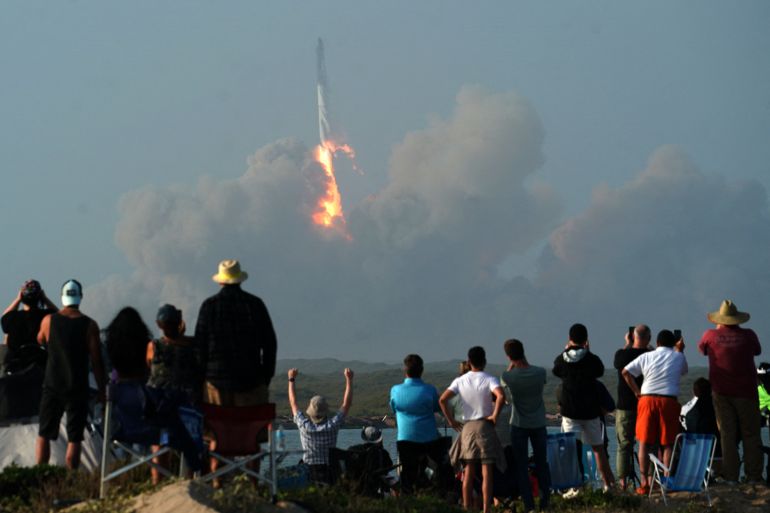Environmentalists sue US regulator over impact of SpaceX launches
SpaceX’s Starship rocket exploded over the Gulf of Mexico on April 20 and debris was scattered from the launch pad.

Conservation groups have sued the United States Federal Aviation Administration (FAA), challenging its approval of expanded rocket launch operations by Elon Musk’s SpaceX next to a national wildlife refuge in South Texas without requiring greater environmental study.
The lawsuit filed on Monday comes on the heels of the April 20 test flight of SpaceX’s next-generation Starship rocket, which ended with the space vehicle exploding over the Gulf of Mexico.
Keep reading
list of 4 itemsSpaceX crew docks at International Space Station
SpaceX scrubs first test launch of behemoth Starship
SpaceX’s Starship rocket explodes after launch
No injuries or significant damage to public property were reported from rocket wreckage or flying pad debris. But large concrete chunks, stainless steel sheets, metal and other objects were hurled hundreds of metres from the launch pad, and a plume of pulverised concrete also sent material up to 6km (4 miles) northwest of the launch site, the US Fish and Wildlife Service (FWS) reported last week.
“Today’s lawsuit argues that the proposed mitigation by the agency isn’t enough to prevent the launch program from causing significant environmental harm,” the Center for Biological Diversity said in a statement.
Jared Margolis, a senior lawyer for the centre, one of five plaintiffs in the case, said that federal officials should defend nearby communities and wildlife, “not give a pass to corporate interests that want to use treasured coastal landscapes as a dumping ground for space waste”.
The plaintiffs are asking the US District Court for the District of Columbia to overturn the FAA’s decision to grant SpaceX a vehicle operator license and force the agency to re-analyse the launch site’s environmental impact.
SpaceX’s Starship soared 39 km (24 miles) high before exploding on April 20 — the latest in a series of at least nine mishaps at the Boca Chica, Texas site in recent years.
The rocket’s self-destruct system caused the nearly 120-metre (400-ft) rocket to blow up, as it spun out of control just minutes into the test flight. The shattering force of the launch hurled chunks of reinforced concrete and metal shrapnel thousands of metres from the site, adjacent to the Lower Rio Grande Valley National Wildlife Refuge near Boca Chica State Park and Beach.
The blast also ignited a 1.4-hectare (3.5-acre) brush fire and sent a cloud of pulverised concrete drifting 10.5 km (6.5 miles) to the northwest and raining down over tidal flats and the nearby town of Port Isabel, according to the FWS.
SpaceX hailed the launch as a qualified success that will yield valuable data to advance the development of its Starship and Super Heavy rocket, major components in NASA’s new Artemis program for returning astronauts to the moon.
An FAA spokesperson said the agency does not comment on active litigation as a matter of policy. There was no immediate word on the case from SpaceX.
Musk, the billionaire founder and chief executive of the California-based company, addressed criticism from environmentalists in remarks during an event on Saturday, saying the debris scattered by the Starship launch amounted to “a human-made sandstorm”.
“It’s not toxic at all or anything,” he said.
“It did scatter a lot of dust, but to the best of our knowledge, there has not been any meaningful damage to the environment that we’re aware of.”